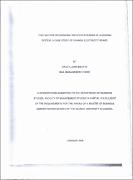| dc.contributor.author | Okoya, John | |
| dc.date.accessioned | 2018-12-17T13:39:43Z | |
| dc.date.available | 2018-12-17T13:39:43Z | |
| dc.date.issued | 2006-01 | |
| dc.identifier.citation | The Factors Influencing theOkoya, J. (2006), Effectiveness of Clocking System: A Case Study of Uganda Electricity Board- Islamic university in uganda. Dissertation. | en_US |
| dc.identifier.uri | http://hdl.handle.net/20.500.12309/615 | |
| dc.description.abstract | The purpose of the study is to investigate the extent to which systematic planning, commitment and resistance to change had an impact on the failure of the UEB Clocking System. The objectives were to establish whether there was a thorough diagnosis of the problem before introducing the Clocking System, to establish whether the Clocking System was an isolated intervention, which did not correspond with the rest of the elements of the organizational system such as the structure, the tasks and the people., to establish level of resistance to change to after the introducing the Clocking System and to relate systematic planning, commitment and resistance to change to the failure of the Clocking System. | en_US |
| dc.language.iso | en | en_US |
| dc.publisher | Islamic university in uganda | en_US |
| dc.subject | Clocking System | en_US |
| dc.subject | Uganda Electricity Board | en_US |
| dc.title | The Factors Influencing the Effectiveness of Clocking System: A Case Study of Uganda Electricity Board | en_US |
| dc.type | Thesis | en_US |

